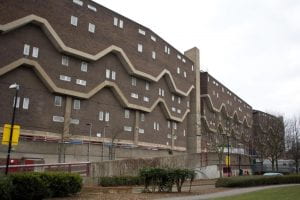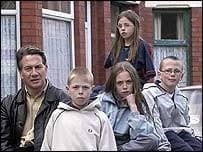Stop MPs stigmatising people living in poverty
By Katrina Scior, on 31 October 2020
We as one of the UK’s leading research centres on stigma have started a petition calling on Government to introduce mandatory training for Members of Parliament (MPs) to help them understand what it’s like to be hard up and stop stigmatising people living in poverty. #Stopstigmatisingpoverty calls on the UK Government to introduce mandatory training for MPs, a week during which they are relieved of their parliamentary duties. The ‘training’ would see each newly elected and all sitting MPs spend 1 week living alongside people in their constituency who are struggling to get by, on the equivalent of universal credit (around £95 at current rates). Members of the local constituency will lay on a programme of events to allow the MP an insight into some of the diverse concerns and stresses their constituents face, with a focus on those living in poverty.
Why this petition?
In the UK around 14.5 million people, that is 21% of the population or 1 in 5, live in poverty, their numbers rising alarmingly fast under the pandemic. If we take a look at these 14.5 million people,we find that 31% of children live in poverty, as do 25% of working age adults with children and 16% of pensioners.
Of children in poverty, around 1.4 million are eligible for free school meals. It was the reaction to Marcus Rashford’s campaign to extend free school meals to holidays during the height of the coronavirus pandemic that made us start this petition. 322 MPs voted to defeat this motion, either because they thought there is nothing wrong with children going to bed hungry or because they valued their jobs more than their moral duty to prevent this from happening. Only five Tory MPs dared to vote against their leader’s orders. One of those five brave souls was Caroline Ansell, MP for Eastbourne and Willingdon, who has since resigned. Explaining her decision, she said in a BBC interview: “In these unprecedented times I am very concerned to be doing all we can to help lower income families and their children who are really struggling due to the impact of the virus.” While she acknowledged that food vouchers have their limitations she said that they could help families in her Eastbourne constituency who were struggling as a result of the pandemic. One Tory MP who opposed the motion, Brendan Clarke-Smith, MP for Bassetlaw, who says he was a recipient of free school meals when he was a child, justified his decision by saying “I do not believe in nationalising children, instead we need to get back to the idea of taking responsibility…This means less celebrity virtue signalling on Twitter by proxy and more action to tackle the real causes of child poverty.” We presume one of the people standing accused of virtue signalling on Twitter is @MarcusRashford who not only singlehandedly has done more to tackle child poverty than the entire government but who in an ironic twist was nominated for his recently awarded MBE by none other than Clarke-Smith’s boss Boris Johnson.
 Others defended their decision to vote against the motion in recent days by suggesting that parents cannot be trusted not to swap the £15 weekly food vouchers for drugs. Such comments suggest that some MPs do not have a clue about the nature of drug dealing and the fact that dealers don’t generally accept food vouchers or sandwiches and crisps as payment, in itself worrying in those charged with overseeing the UK’s drugs policy. Even more alarming from our viewpoint is that MPs are willing to denigrate families living in poverty and stereotype them as irresponsible or even criminals in order to cover their own backs as the country responded with outrage to the vote in Parliament.
Others defended their decision to vote against the motion in recent days by suggesting that parents cannot be trusted not to swap the £15 weekly food vouchers for drugs. Such comments suggest that some MPs do not have a clue about the nature of drug dealing and the fact that dealers don’t generally accept food vouchers or sandwiches and crisps as payment, in itself worrying in those charged with overseeing the UK’s drugs policy. Even more alarming from our viewpoint is that MPs are willing to denigrate families living in poverty and stereotype them as irresponsible or even criminals in order to cover their own backs as the country responded with outrage to the vote in Parliament.
So what does this 22 year old footballer from Manchester know that most  MPs don’t? Marcus Rashford MBE is a professional footballer who plays for premier league club Manchester United and the England national team. While very wealthy now, as a child he experienced what it’s like to be poor and to go hungry, not because his mum was irresponsible or didn’t care but because life on a low income is often a huge struggle. Most MPs have never experienced serious financial hardship. They also appear to think there is little wrong with dismissing those living in poverty as only having themselves to blame, or stigmatising them as undeserving scroungers. As award-winning journalist and author Mary O’Hara notes in her book The Shame Game, politicians’ narrative of poverty as down to individual wrongdoings and personal flaws rather than policy choices or systems that maintain inequality has become deeply embedded in the public consciousness and has serious consequences for how financially vulnerable people are seen, spoken about and treated.
MPs don’t? Marcus Rashford MBE is a professional footballer who plays for premier league club Manchester United and the England national team. While very wealthy now, as a child he experienced what it’s like to be poor and to go hungry, not because his mum was irresponsible or didn’t care but because life on a low income is often a huge struggle. Most MPs have never experienced serious financial hardship. They also appear to think there is little wrong with dismissing those living in poverty as only having themselves to blame, or stigmatising them as undeserving scroungers. As award-winning journalist and author Mary O’Hara notes in her book The Shame Game, politicians’ narrative of poverty as down to individual wrongdoings and personal flaws rather than policy choices or systems that maintain inequality has become deeply embedded in the public consciousness and has serious consequences for how financially vulnerable people are seen, spoken about and treated.
Michael Portillo or How can we teach MPs about the real world?
One MP who was given the opportunity to swap his wealthy lifestyle and experience poverty first hand is Michael Portillo, now a broadcaster but then a high profile politician. In 2003, Portillo swapped Westminster for life as a single working parent for BBC TV series ‘My week in the real world’. For one week, he stepped into the shoes of a single mum of four and lived in a council flat, having to get by on benefits. He showed how much MPs can learn about life on the breadline while becoming kinder and more humble people. One of the programme’s viewers, our research unit’s Director Professor Katrina Scior says “Ever since watching this programme 17 years ago I’ve thought how much British politics would change if all MPs were given a similar opportunity to Portillo. Doctors, nurses, teachers and many others have to do all manner of mandatory training, so why not MPs?” Hence inspired by Marcus Rashford we have started this petition to afford every MP this opportunity and help make the UK a kinder and more equal nation through mandatory training to #Stopstigmatisingpoverty.
Who we are
As a dedicated Unit for Stigma Research at UCL, one of the world’s leading universities, we know a thing or two about stigma and its devastating consequences. Stigma, a term that’s hardly ever out the media but often not well understood, was defined by Erving Goffman as “An attribute that is deeply discrediting…and that reduces the bearer from a whole and usual person to a tainted, discounted one.” One of the UK’s most prominent researchers on stigma, Sir Graham Thornicroft, described stigma as problems of knowledge (ignorance), attitudes (prejudice) and behaviour. While we are generally cautious about using the blaming tone of terms such as ‘ignorance’, Thornicroft’s account of stigma is very relevant to this petition and to understanding many MPs‘ stance on poverty. Scientific research gives us a good understanding of the impact of statements and behaviours like those displayed by the Government and MPs in recent weeks and the huge harm they inflict on the millions who live in poverty. The language used often shifts the focus from societal problems and structural sources of inequality to explanations that lay the blame firmly at the door of the individual, as Carla McCormack of the Poverty Alliance has noted.
If we look to scientific research, we find overwhelming evidence for the power of stigma in driving inequalities and marginalising a large section of society, be this through lack of access to employment and the financial and human rewards it can offer, or reduced access to good quality housing, education or health care. Branding them as irresponsible ensures that they do not have a voice in society and are disregarded as worthless when they do try to speak up. The dehumanising effects of stigma are most evident when a person begging in the street or on the London underground finds themselves shunned, those who have the power to help them and acknowledge their shared humanity either avoiding their gaze or moving away altogether as though being poor is an infectious disease. In turn, the effects of marginalisation and deprivation on both physical and mental health have long been understood and are summarised in the 2020 Marmot Review, published just before lockdown hit. The Review’s data on health inequities are without question by now superseded by an ever greater gap between the haves and the have nots, the effects of the pandemic falling disproportionately on the most vulnerable: people living in poverty, the working poor, people with disabilities, and other marginalised groups, as analyses by the Institute for Fiscal Studies and the United Nations show.
Not only does stigma have the effect of stacking the odds even higher against people who are already disadvantaged but it can also get under their skin. Confronted with others’ disdain and judgmental attitudes and language, many internalise others’ prejudices and experience feelings of worthlessness and shame. Such feelings not only have a corrosive effect on their self-esteem but may also deter them from claiming all of the benefits they are entitled to, thereby keeping them in a vicious cycle of poverty, as a recent study by researchers at the University of Kent shows.
University College London’s Unit for Stigma Research (UCLUS) is a group of researchers in the fields of psychology, mental health and education. The unit’s Director Professor Katrina Scior notes that UCLUS members are not just researchers but human beings who see signs of severe hardship and people struggling under the huge burden of poverty wherever they go. So when the government shamefully voted against Marcus Rashford’s campaign to #Endchildfoodpoverty and extend free school meals to the October half-term break, and some MPs engaged in the usual attempts to shame poor people to defend their vote we decided that enough is enough.
Scior herself comes from humble beginnings and had the great fortune to be the first in her family to go to university. She has since risen to Professor of Psychology and Stigma Studies at University College London, one of the world’s top 20 universities. In the 1980s, she lived in social housing flats in South London, including the Barrier Block in Brixton. Her shared flat there had mice, burglars and drug dealers regularly stationed around the corner. Before becoming a psychologist she worked as a youth worker including with youngsters from London’s White City Estate and council estates around West London. Many of the youngsters lived in very deprived circumstances and could only dream of the privileged lifestyle MPs and their families enjoy.
In 2003 Professor Scior watched a BBC programme, ‘My week in the real world’, in which Tory MP Michael Portillo swapped his wealthy Westminster lifestyle for life as a single parent on benefits on a council estate on Merseyside. He had to balance the household budget of £80 as well as take on Jenny Miner’s two jobs as a classroom assistant and supermarket cashier in Asda, as well as look after her four children. Up to this point Scior admits not having been a great fan of Portillo who often showed the same arrogance and unquestioning self-assurance as many of his (white male) colleagues in Westminster. However, over the course of the hour long programme viewers witnessed a powerful transformation of this confident, wealthy man into someone who talked openly about the stresses of trying to parent four children while having to get by on very little. He showed great respect for Jenny Miner’s position and for her kids and none of the usual talking down to poor people and stigmatising attitudes that MPs often display. Producer Alison Cahn said at the time: “I asked him how it compared to having a war of words in the House of Commons and he said, ‘it’s tougher’.” As to what made the experience so tough, she added: “He couldn’t pay anyone else to do the cooking or the washing or look after the kids…He had to learn to count the pennies and value money in a totally different way.”
Over the intervening 17 years this programme has really stuck with Professor Scior. She has never forgotten how powerful it was to watch this affluent, supremely confident Conservative MP and former Government Minister struggle with getting Miner’s children off to bed, or feeding them on very little money. A politician perceived by many as ‘just another wealthy Tory’ faced with someone else’s tough life suddenly appeared vulnerable, kind, compassionate and humble. Many viewers felt the same, as this comment by Philip Devin on the BBC website shows: “I only wish more of our MPs would take up the challenge and take the trouble to understand more about the real life of those they purport to lead.”
For experts on stigma it is not surprising that the BBC programme should have had such a powerful effect not just on Portillo but also on the viewers. While campaigns to challenge poverty stigma are in place across the UK, such as Challenge Poverty Week or Scotland’s Stick Your Labels, their impact in terms of changing attitudes and reducing stigma are not as well understood as those of anti-stigma interventions in other fields. Looking to stigma associated with mental health challenges, one of the most researched stigmatised conditions, we find that for adults being educated about what it means to live in poverty combined with contact with those affected is the most effective route to reducing stigma. This was the conclusion from a meta-analysis (a research method that brings together the results of lots of other research studies, in this case 72 with a combined total of over 38,000 participants), by Professor Pat Corrigan and other leading experts on mental health stigma. Of note, in their meta-analysis contact with individuals or groups of people who carry the stigmatised attribute emerged as twice as effective as education alone when employed to change adults’ attitudes but for teenagers education was better in reducing in mental health stigma.
So, let’s ‘follow the science’ as our Government so often says these days and let’s stop relying on very occasional TV programmes to teach MPs what life in the real world is like. Instead let’s help them on this path through a mandatory training programme for MPs. Let us stop MPs demeaning people living in poverty and blaming them for their misfortunes. Let us ask Government to introduce mandatory training for all MPs to help them understand what it’s like to be hard up and #stopstigmatisingpoverty. Let us make the UK a kinder and more equal country.
What will mandatory #Stopstigmatisingpoverty training consist of?
The ‘training’ will be for all newly elected MPs as well as sitting ones. It will consist of one week spent living in areas of high deprivation alongside members of their constituency who are struggling to get by. They will be given the equivalent of universal credit (or basic benefits current at the time) to get by for the week and will be expected to commit to not using any cash or bank cards to ‘top up’ the allocated fund. Members of the local constituency will lay on a programme of events to allow MPs an insight into the diverse concerns of their constituents. During the week they will be relieved of all parliamentary duties.
Support our petition on change.org: #stopstigmatisingpoorpeople
The #stopstigmatisingpoorpeople petition was posted on change.org by the UCL Unit of Stigma Research, University College London, Gower Street, London WC1E 6BT
We thank the following colleagues for backing this petition:
Professor Dan Goodley, PhD, Co-Director, iHuman, School of Education, University of Sheffield
Professor Nora Groce, PhD, Director, UCL International Disability Research Centre, University College London
Dr Ahmed Hankir, MBChB MRCPsych, Senior Research Fellow, Centre for Mental Health Research in association with Cambridge University
Dr Maria Kett, PhD, Associate Professor in Humanitarianism and Disability, UCL Institute of Epidemiology and Healthcare
Professor John King, PhD DClinPsy, Professor of Clinical Cognitive Neuroscience, University College London
Dr Emma Silver, DClinPsy, Director of Wellbeing, Highgate School, and Consultant Clinical Psychologist, Tavistock and Portman NHS Foundation Trust
 Close
Close






